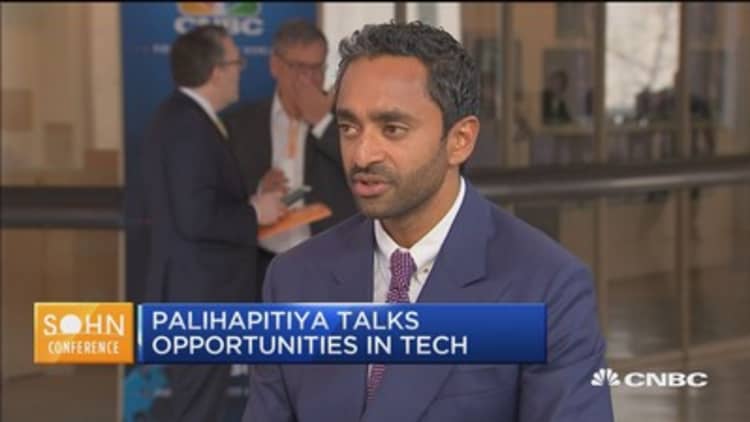data obtained by Cambridge Analytica was probably not used for Donald Trump's presidential election campaign, according to the academic at the heart of the data scandal surrounding the social network.
Aleksandr Kogan, a researcher at Cambridge University, made the claim to U.K. lawmakers at a committee on fake news and data protection on Tuesday. Kogan's company Global Science Research shared data on millions of Facebook users — and their friends — with Cambridge Analytica.
"I think it is unlikely," he said of claims that Facebook data he shared with Cambridge Analytica was used to help Trump's campaign.
Cambridge Analytica, which is backed by Republican donor Robert Mercer, initially worked for Ted Cruz's presidential campaign but switched to help Trump's campaign after Cruz backed out of the race.
Kogan said Cruz's campaign team was "unhappy" with the micro-targeting product that was used by Cambridge Analytica to influence voters.
"The reason I think it's unlikely is my understanding from talking to others who knew a bit more — because this is much after my time — but my understanding is the Ted Cruz campaign was quite unhappy with the product that SCL (Cambridge Analytica's parent company) delivered to them.
"And also SCL at this point is under enormous pressure from Facebook to clean up their act and delete all the data. If I'm a company, I don't know if I would risk the legal liability of Facebook suing me to keep a data set that has apparently failed with the last client it was used for."
Kogan said that it was difficult to distinguish between SCL and Cambridge Analytica.
Cambridge Analytica was not immediately available for comment when contacted by CNBC.
Reports have said that Kogan shared the data of 50 million Facebook users to Cambridge Analytica without their permission. Facebook has admitted that 87 million users' profiles were shared with the organization. Cambridge Analytica has refuted this number, and maintains only 30 million profiles were shared.
Kogan had 'brief' Facebook contract
Kogan said in written evidence to the committee that he began collaborating directly with Facebook in 2013, on studies that aimed to enhance understanding of people's emotions. He said the social network provided him with a number of "macro-level" data sets on Facebook friendships and the use of emoticons.
Facebook said that it was true that the researcher approached Facebook in 2013 to undertake research using anonymized, aggregated data, and that in 2015 he had a "brief" consulting contract with the firm.
"At no point during these two years was Facebook aware of Kogan's activities with Cambridge Analytica," Ime Archibong, Facebook's vice president of product partnerships, said in a statement.
"It was not until December 2015 that we first learned Kogan had broken Facebook's terms of service by selling to Cambridge Analytica Facebook information collected via an app he built.
"We quickly shut down his app, demanded he delete all the information (which he confirmed in a signed statement he had) and ended any research work with him.
"In hindsight, we should have followed up to confirm he had deleted the information, as well as notified the people impacted – both of which are now happening."
Kogan spoke out in his first broadcast interview following the data scandal on Sunday with CBS' "60 Minutes." He said that Facebook's tools allowed developers to gain access to the data of users and their friends, whether the friends of users had given their consent or not.
"It seems crazy now but this was a core feature of the Facebook platform for years," he told the show. "This was not a special permission you had to get. This was just something that was available to any developer that wanted it."
Kogan created an app in 2013 called "This Is Your Digital Life" that used psychological quizzes to gather data on Facebook users. The data was then shared to Cambridge Analytica.

Controversy has surrounded Facebook in the wake of the scandal, as concerns grow over how data may have been used to influence various elections, including the U.S. presidential election and the U.K.'s vote to leave the European Union, both in 2016.
You can read a timeline of how the scandal emerged here.
Kogan: Facebook CEO a hypocrite
Kogan said Facebook CEO Mark Zuckerberg is "totally" a hypocrite on Monday.
Zuckerberg told U.S. congressmen earlier this month: "If a developer who people gave their information to, in this case Aleksandr Kogan, then goes and in violation of his agreement with us, sells the information to Cambridge Analytica, that's a big issue. People have a right to be very upset; I'm upset that that happened."
But Kogan said that tens of thousands of other developers were employing similar practices to his app. He said on Tuesday that Facebook's attacks on him following the scandal were likely the result of the social media giant undergoing "PR crisis mode."
Cambridge Analytica's former boss, Alexander Nix, was exposed on camera in March saying that the firm ran the digital operations for Trump's 2016 campaign. Nix was ousted from the firm on the same day the expose was broadcast.
Clarence Mitchell, spokesperson for Cambridge Analytica, said at a press conference later on Tuesday: "Kogan's view of what Facebook did or didn't do, or their attitude — in fact the wider attitude of Silicon Valley as a whole — towards data collection and us as consumers apparently not much caring is clearly wrong and therefore that conversation, that narrative, needs to be happening now.
"And that's exactly the sort of conversation the company would like to be involved in. Because, as I have said: No laws were broken. We did not use the disputed data on the Donald Trump campaign.
"We did not work on the official Brexit referendum campaign for either side. And we continue through legitimate business means to talk to political parties around the country, around the world, as normal."


